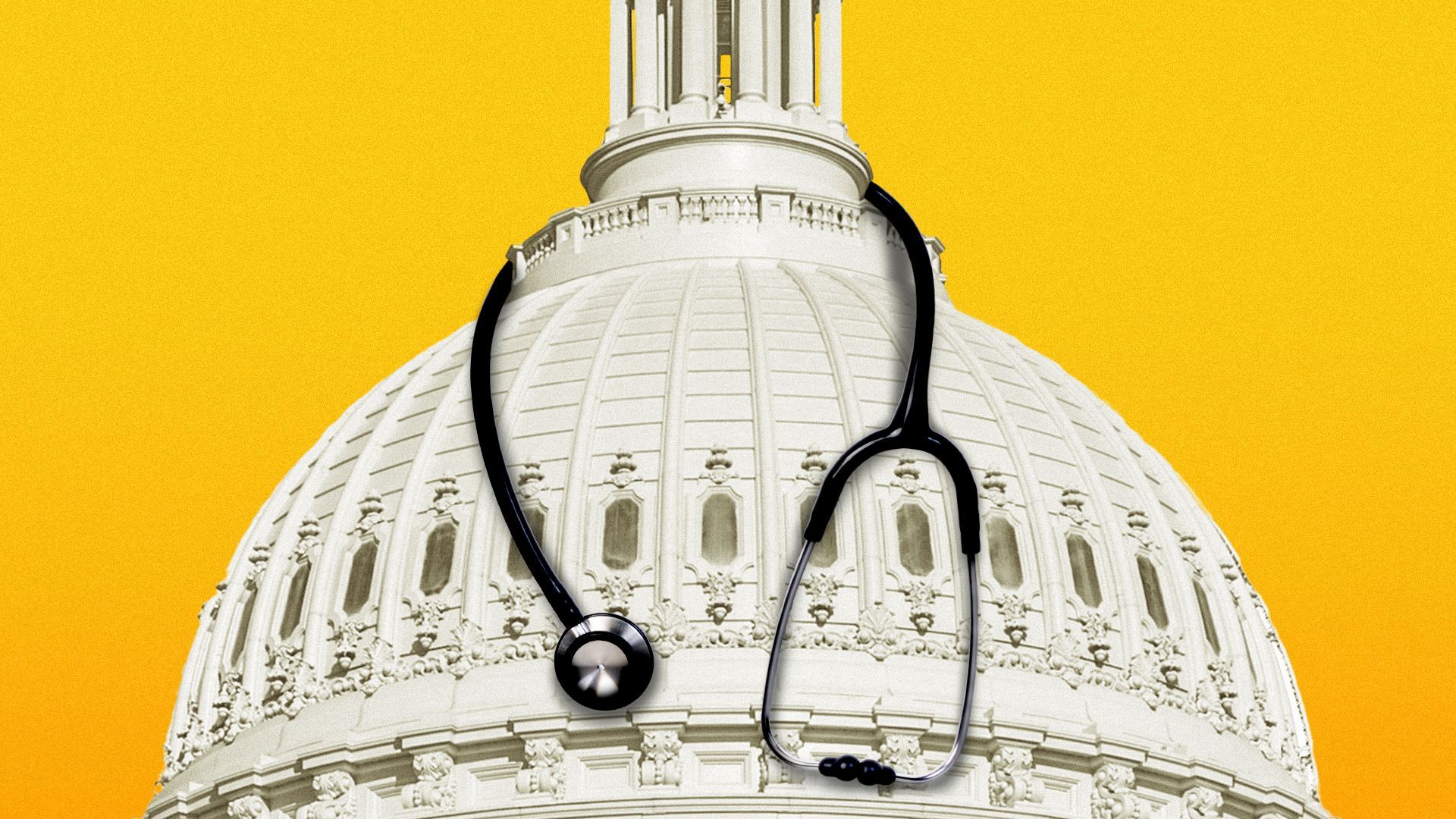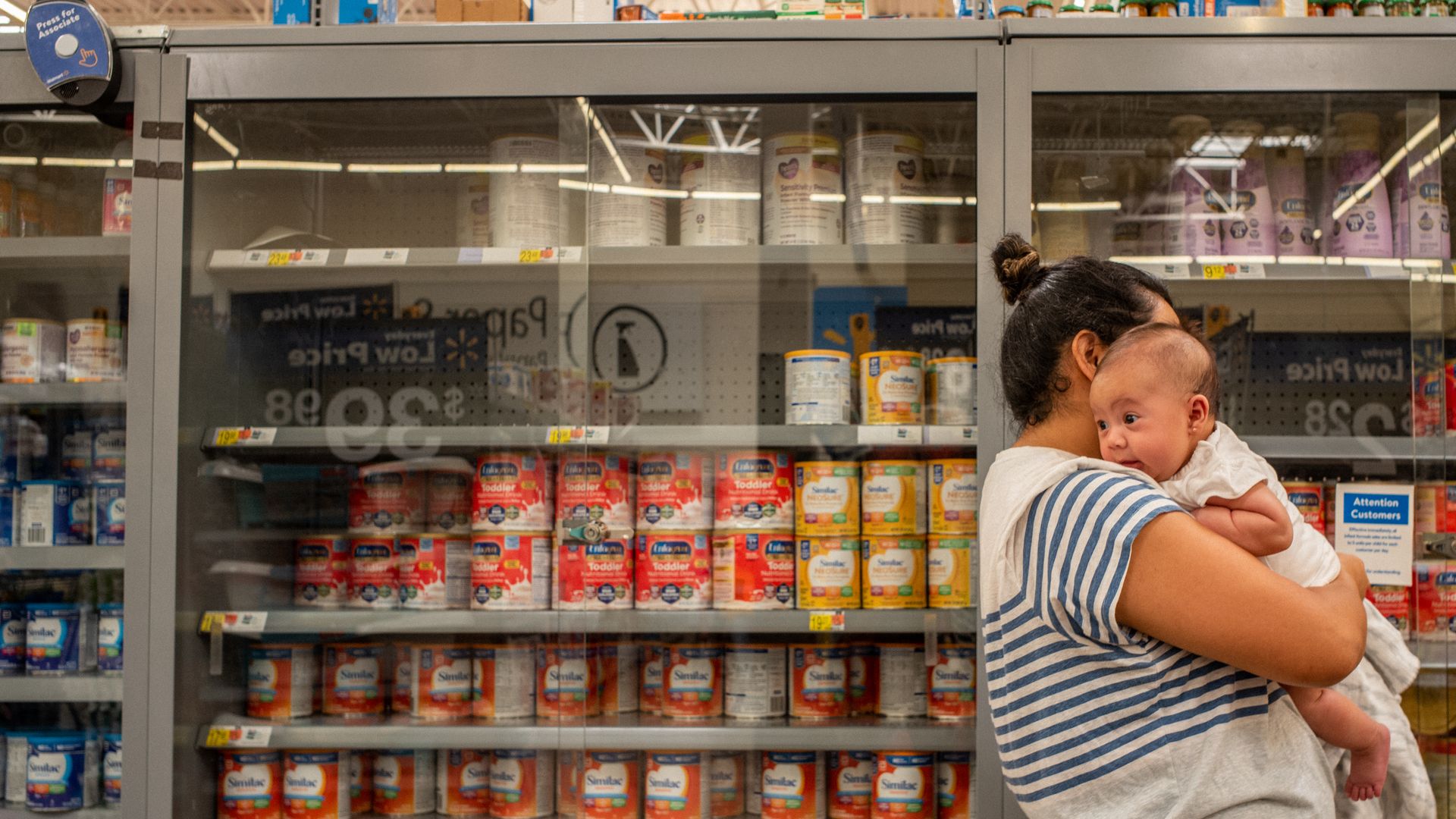| |
| |
| |
| |
| |
| Axios Vitals |
| By Tina Reed · May 25, 2023 |
| Happy Thursday, Vitals readers. Today's newsletter is 1,144 words or a 4½-minute read. 🧠 Situational awareness: The White House Cancer Moonshot will host leaders from the brain cancer community at a forum today to discuss efforts to improve outcomes of patients with conditions including glioblastoma. |
| |
| |
| 1 big thing: GOP fentanyl plan exposes fault lines over policing in drug policy |
 |
|
| Illustration: Shoshana Gordon/Axios |
| |
| House Republicans' first major attempt to address the opioid crisis since taking power is resurfacing a long-running debate over the role of law enforcement in drug policy, Axios' Sabrina Moreno writes. Driving the news: The GOP-sponsored HALT Fentanyl Act is up for a House vote Thursday, marking the 117th Congress' first substantive response to the epidemic. - It's also backed by President Biden, who said it's critical to fighting the supply of fentanyl-related substances reaching the U.S.
- Rep. Bob Latta (R-Ohio), who helped introduce the bill, tweeted that the legislation would "help put an end to this scourge."
Catch up quick: The bill would permanently move fentanyl-related substances into the highest classification of illegal drugs under the Controlled Substances Act, with the potential for high misuse with "no currently accepted medical value." - It would establish mandatory minimum sentences for nonviolent drug distribution of fentanyl without parole and create a special registration process for researchers to conduct studies on these substances for potential medical use.
- House Republicans on Monday struck down a series of Democratic amendments that would have exempted fentanyl test strips and included a required government watchdog report on the effect of the legislation.
Yes, but: Public health experts and most Democrats say it risks repeating mistakes made during the 1970s war on drugs, which is largely seen as a failure that didn't stop illegal drug use and led to high imprisonment rates. - "There's no reason to believe that this bill is going to make a difference" in fentanyl overdose deaths, Rep. Frank Pallone (D-N.J.) told the House Energy and Commerce Committee on Monday.
What they're saying: The bill will likely do little to stop low-or-high-level drug dealers since there are already "pretty tough penalties in place," said Keith Humphreys, a Stanford professor who advised the George W. Bush and Obama administrations on drug policy. - "You've already kind of deterred the deterrable," Humphreys told Axios. And, "You can't imprison the whole world."
Go deeper: What to know about the fentanyl crisis |
    |
| |
| |
| 2. House panel advances transparency and PBM bills |
 |
|
| Illustration: Gabriella Turrisi/Axios |
| |
| The House Energy and Commerce Committee on Wednesday advanced a series of health care measures to promote price transparency and overhaul regulation of pharmacy benefit managers (PBMs) in a mostly bipartisan markup, Axios' Peter Sullivan writes. Driving the news: The measures advanced on a unanimous 49-0 vote addressed: - Codifying and strengthening Trump-era rules to require hospitals and insurers to make negotiated prices more easily available.
- Imposing new transparency requirements on PBMs and banning PBMs' ability to charge more than they pay for a drug and keep the difference in Medicaid.
- Providing funding for community health centers and graduate medical education, as well as putting off cuts in disproportionate share hospital payments that offset some facilities' uncompensated care costs.
What we're watching: Even the more modest site-neutral policies that were considered, like equalizing payment for physician-administered drugs, drew concerns from New York Democratic Reps. Paul Tonko and Yvette Clarke, who warned of the effects on hospitals. - That highlights the even tougher lift facing the bigger site-neutral payment policies that were left out, for now, which address the way hospitals charge more for the same services private doctors deliver in their offices.
A version of this story was published first on Axios Pro. Get news like this by subscribing. Use code POLICY100 which gives you $100 off. |
    |
| |
| |
| 3. FTC investigating baby formula manufacturers |
 |
|
| Photo: Brandon Bell/Getty Images |
| |
| Infant formula makers are facing scrutiny from the Federal Trade Commission over whether they colluded on their bids for state contracts, the Wall Street Journal reported. Driving the news: In documents posted online, the FTC told Abbott Laboratories it is eyeing whether the company coordinated with other companies on contracts that supply formula through the Special Supplemental Nutrition Program for Women, Infants and Children (WIC). - Abbott — the leading supplier of formula in the U.S. — was at the center of the shortage last year that sparked a monthslong crisis following a recall of Similac and the closure of one of its plants for safety issues.
- The company previously disclosed it was under investigation by the FTC over its contracting through the WIC program, in a Securities and Exchange Commission filing. It is also facing SEC and Department of Justice investigations.
Zoom in: The FTC is seeking information to evaluate "whether WIC contract holders had incentives not to bid against each other and which specific WIC bidding opportunities may have been tainted by coordination or collusion," commissioner Alvaro Bedoya wrote. - An Abbott spokesman said the company is cooperating with the FTC's requests. "Abbott is unaware of any factual basis to support the WIC-related investigation," they said in a response to the FTC.
Catch up quick: The industry and regulators at the FDA have come under sharp scrutiny following the shortages. - Nestlé and Reckitt Benckiser, which also bid for WIC contracts, did not immediately respond to requests for comment Wednesday. The FTC declined to comment.
|
    |
| |
| |
| A message from Axios |
| Our radical new approach to policy reporting |
| |
 |
| |
| Axios Pro: Policy only sends you updates when news breaks, not every day on an artificial cadence. That's news essentialism, designed to save you time. - It's what you need, when you need it, as soon as we know it.
Experience it for yourself. |
| |
| |
| 4. Medicaid unwinding will catch many off-guard, survey shows |
 Data: Center for Medicare and Medicaid Services; Chart: Tory Lysik/Axios Visuals About 1 in 4 Medicaid enrollees don't know where to look for other coverage if they fall off the safety net program's rolls, and 15% say they'll be uninsured, according to a new KFF survey, Axios' Arielle Dreher writes. Why it matters: The findings begin to quantify how unprepared many enrollees are for the eligibility renewal process that's begun in states with the end of the COVID-19 public health emergency. - 65% of recipients say they didn't have a change in income or other change that would make them ineligible for the program, underscoring the importance of navigating the renewal process and not getting lost in bureaucratic churn.
What they found: KFF surveyed more than 3,600 insured adults in February and March, including more than 1,200 adults with Medicaid coverage. 65% of those on Medicaid were not aware that states could start kicking people off the rolls this year. - One-third of enrollees had not provided contact information to their state Medicaid agency in the last year, which means they might be culled because of the inability to reach them.
- If their Medicaid coverage is terminated, 27% wouldn't know where to look for other health coverage, and 15% say they would just be uninsured.
Zoom out: More than 192,000 people have been kicked off Medicaid in five states where redeterminations have started. Share this story. |
    |
| |
| |
| 5. AHIP's Eyles to step down |
| Matt Eyles, the head of AHIP — the national trade association representing health insurers — is stepping down in October, the organization announced Wednesday. - Eyles, who has been CEO of AHIP for five years, has been a fixture on Capitol Hill as an industry advocate. AHIP said it will conduct a national search for his replacement.
|
    |
| |
| |
| 6. Catch up quick |
| 💊 Congress took on high drug prices in Medicare. Now Biden wants to take it to Medicaid. (STAT) 🏥 Hospitals need to focus on social drivers of American health. (Time) 🥵 A heat wave and black out would hospitalize half of Phoenix residents. (Axios) 🫀 In the "Wild West" of outpatient vascular care, doctors can reap huge payments as patients risk life and limb. (ProPublica) |
    |
| |
| |
| A message from Axios |
| Our radical new approach to policy reporting |
| |
 |
| |
| Axios Pro: Policy only sends you updates when news breaks, not every day on an artificial cadence. That's news essentialism, designed to save you time. - It's what you need, when you need it, as soon as we know it.
Experience it for yourself. |
| |
| Thanks for reading Axios Vitals, and to senior editor Adriel Bettelheim and senior copy editor Bryan McBournie. Please ask your friends and colleagues to sign up. |
 | | Dive deeper into the future of health care | | |
No comments